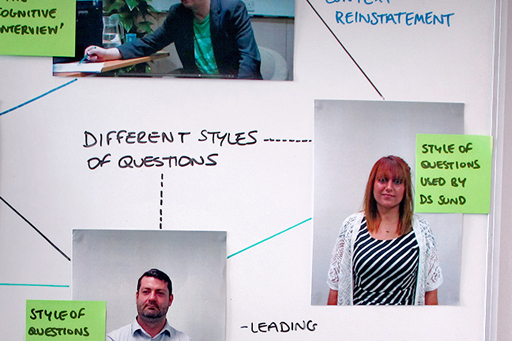3.1 Evaluating the evidence in the interviews

Next, you are asked to work out the style of questions used by DS Sund in the interviews and, just as you did for DI Bullet.
To help you evaluate the interviews conducted by DS Sund, the next activity involves looking at the particular styles of questioning that she used. For each question in the activity, you will be provided with a question that was used by DS Sund in the audios of the interviews that you heard. Your job is to decide which of four question styles is being used. Identifying the question style will help you evaluate the evidence gained in the interview.
Here is a quick summary of the four question styles to help you with the activity:
Leading questions
The questions tend to strongly suggest what response is expected, and/or assume details that have not been provided by the witness.
Open questions
These questions seek an open-ended response from the witness, and do not limit, focus or direct the witness’s response except in the most general way.
Focused questions
These questions focus the witness’s attention on details or aspects of the event that the witness has previously described. They direct the witness to search their memory for details or aspects of the event that they have mentioned previously.
Option-posing questions
These questions limit the response the witness can give to specific options, and usually focus on aspects of the event which the witness has not already described.
Activity 5 Evaluating DS Sund’s interview questions
a.
A leading question
b.
An open question
c.
A focused question
d.
An option-posing question
The correct answer is c.
c.
Well done. Focused questions direct the witness to search their memory for details or aspects of the event that they have mentioned previously. Here the witnesses is being asked to focus on providing information about the point at which they first saw the car.
a.
A leading question
b.
An open question
c.
A focused question
d.
An option-posing question
The correct answer is c.
c.
Well done. Focused questions are those that focus the witness’s attention on details or aspects of the event that the witness has previously described. Focused questions direct the witness to search their memory for details or aspects of the event that they have mentioned previously. Here the witnesses is being asked to focus on providing information about what happened just before the car drove away.
a.
A leading question
b.
An open question
c.
A focused question
d.
An option-posing question
The correct answer is d.
d.
Well done. An option-posing question limits the response the witness can give to specific options, and usually focuses on aspects of the event which the witness has not already described. Here the question essentially limits possible reponses to either confirm or deny whether the driver was wearing a mask.
a.
A leading question
b.
An open question
c.
A focused question
d.
An option-posing question
The correct answer is b.
b.
Correct! Open questions seek open-ended responses from the witness, and do not limit, focus or direct the witness’s response except in the most general way.
a.
A leading question
b.
An open question
c.
A focused question
d.
An option-posing question
The correct answer is c.
c.
Correct! Focused questions are those that focus the witness’s attention on details or aspects of the event that the witness has previously described. Focused questions direct the witness to search their memory for details or aspects of the event that they have mentioned previously. Here the witnesses is being asked to focus on providing information about the place where the crime occurred.
a.
A leading question
b.
An open question
c.
A focused question
d.
An option-posing question
The correct answer is c.
c.
Well done. Focused questions are those that focus the witness’s attention on details or aspects of the event that the witness has previously described. Focused questions direct the witness to search their memory for details or aspects of the event that they have mentioned previously. Here the witnesses is being asked to focus on providing information about a particular person.
